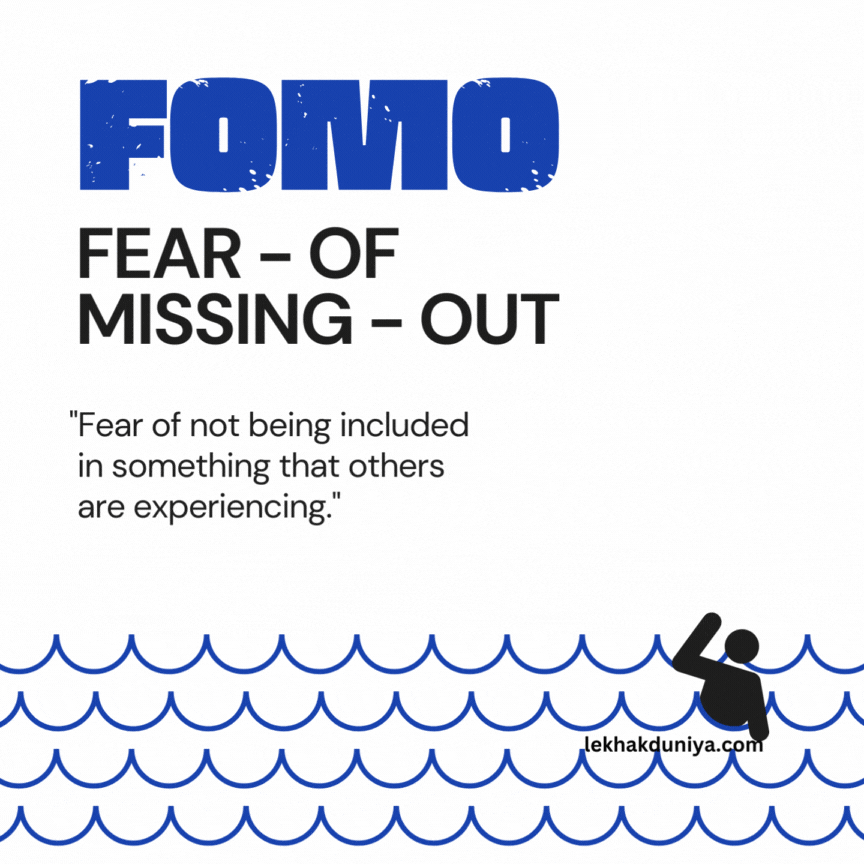In this digital world, the Fear of Missing Out (FOMO) has become a major concern. This anxiety stems from the belief that others are enjoying rewarding experiences while you are not. With social media amplifying every highlight of others’ lives, understanding FOMO is crucial for maintaining your mental well-being. Dive into this article to explore the psychology behind FOMO and discover practical tips for overcoming it.
What is FOMO?
Fear of Missing Out refers to the unease you feel when you think others are having more exciting or fulfilling experiences without you. While this feeling has always existed, the constant exposure to curated moments on social media has intensified it.
The Psychology Behind FOMO

Several psychological factors contribute to FOMO:
- Social Comparison: We often measure our worth by comparing ourselves to others. Seeing friends and acquaintances having fun can lead to feelings of inadequacy and the belief that we’re missing out.
- Desire for Belonging: According to Maslow’s Hierarchy of Needs, belonging is a fundamental human need. FOMO preys on this desire, making us feel that we must participate in certain activities to be included or accepted.
- Instant Gratification: Social media is designed to provide immediate rewards through likes, comments, and shares. This constant feedback can heighten FOMO by making you feel you’re missing out on instant pleasure or validation.
Cognitive Biases Amplifying FOMO
Several cognitive biases exacerbate the fear of missing out:
- Scarcity Effect: This bias makes things seem more valuable when they are perceived as rare. Social media often highlights exclusive events or opportunities, increasing the fear of missing out.
- Bandwagon Effect: This is the tendency to do something because others are doing it. Seeing many people participate in an activity can pressure you to join in, even if it’s not something you genuinely want.
- Availability Heuristic: This mental shortcut leads us to overestimate the frequency of events based on how easily examples come to mind. Frequent exposure to exciting posts can make you believe such experiences are more common than they are.
How FOMO Affects Your Life

FOMO can impact your mental and emotional health in several ways:
- Mental Health: Persistent fear of missing out can lead to heightened anxiety, stress, and feelings of inadequacy. It may contribute to lower self-esteem and even depression.
- Social Behavior: Driven by fear of missing out, you might overcommit to social events and activities which can lead to burnout and neglect of your needs.
- Social Media Use: Social media amplifies the fear of missing out by presenting an idealized version of reality. Constant exposure to curated highlights can distort your view and exacerbate feelings of missing out.
Recognizing FOMO in Your Life
To identify the fear of missing out, look for these signs:
- Behavioral Patterns: Frequent social media checking and feeling compelled to attend events to avoid missing out are common indicators.
- Emotional Responses: Anxiety or disappointment, when you see others enjoying activities you weren’t part of can signal fear of missing out.
Effective Strategies to Combat FOMO
Here are practical tips to help manage and overcome FOMO:
- Practice Mindfulness: Mindfulness helps you stay present and aware of your fear of missing out on triggers. Techniques like meditation and deep breathing can reduce anxiety and enhance your appreciation of your own experiences.
- Set Boundaries: Limit your social media use and avoid comparing yourself to others. Creating tech-free zones or times can help you focus on real-life interactions.
- Reframe Your Thoughts: Challenge negative thoughts associated with the fear of missing out. Focus on the positives in your life rather than what you might be missing.
- Cultivate Gratitude: Develop a gratitude practice to shift your focus from what you lack to what you have. Keeping a gratitude journal can boost your appreciation of your own life.
- Engage in Offline Activities: Invest time in meaningful offline activities. Pursue hobbies, spend quality time with loved ones, and engage in experiences that bring you joy and fulfillment.
The Role of Social Media in FOMO
Social media significantly contributes to the fear of missing out by presenting an idealized version of reality. Platforms like Instagram and Facebook showcase curated highlights that can distort your perceptions and increase feelings of inadequacy. Understanding this can help you manage social media’s impact on your emotions.
Embracing a Balanced Life
To reduce the impact of FOMO, focus on creating a balanced life that values your own experiences. By setting boundaries, practicing mindfulness, and engaging in activities that bring you genuine joy you can mitigate FOMO and enhance your overall well-being.
FOMO is a common psychological phenomenon that can affect your mental health and social behavior. By understanding its roots and applying effective strategies, you can manage its impact and lead a more balanced, fulfilling life. Remember, it’s not about missing out – it’s about making the most of what you have.
We’d love to hear from you! Tell us about your experiences with FOMO in the comment section below. How has FOMO affected your life, and what strategies have you found effective in managing it? Join the conversation and take steps toward a more fulfilling life today!




BaddieHub Hi there to all, for the reason that I am genuinely keen of reading this website’s post to be updated on a regular basis. It carries pleasant stuff.